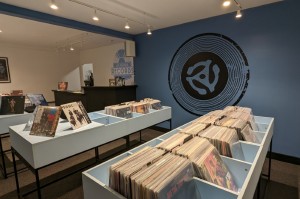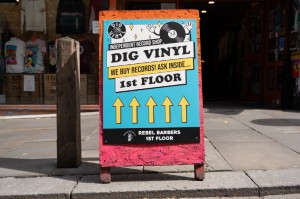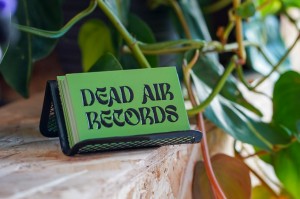Danny Fields, Viv Albertine & Jane Weaver @ Liverpool Sound City 2015
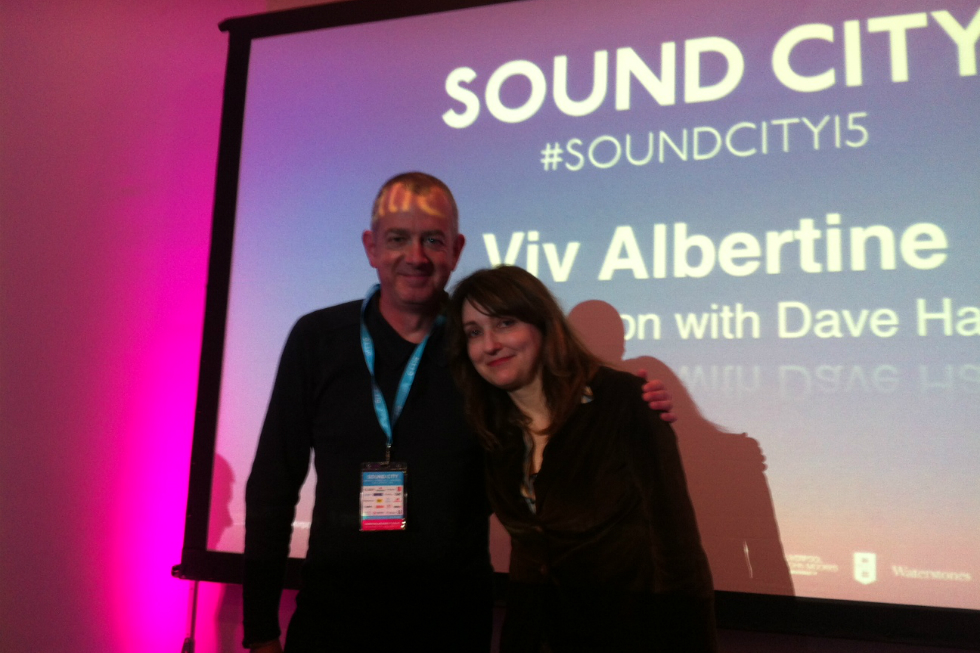
Violence, death and dogged determination: Laura Robertson charts the meteoric rise and fall (and rise again) of three industry pioneers at this year’s Sound City conference…
A welcome addition to Friday’s conference line-up saw an ‘in conversation’ triple-bill from three self-effacing trailblazers that have seen their fair share of both success and heartbreak on both sides of the Atlantic.
The first speaker to share a warts-and-all version of the music industry was Danny Fields: manager of The Ramones, MC5 and Iggy and The Stooges, friend to Nico and Andy Warhol, and credited with pushing along the careers of UK punk artists like the The Clash and the Sex Pistols. Giving us our favourite quotes of the conference — “He started punching me in the head, so I figured I was fired” — Fields gave a forthright and compelling insight into US Punk History in all its dirty glory. He ultimately communicated the merits of trying his luck at a time when anything seemed possible.
Prompted by BBC 6 Music’s Julie Cullens, and in a wonderfully laconic voice, Fields gave us a whirlwind recap of his career since the 1960s; starting — unexpectedly — with studying at Harvard Law School. Bored and frustrated, Fields fell into editing Datebook teen magazine, covering the early years of The Velvet Underground and The Who.
He told us about the moment when he realised that a small publication could cause a huge heap of trouble; making the editorial decision to paste the most contentious Beatles’ quotes on Datebook’s front cover in 1966 — including John Lennon’s now infamous quote: “I don’t know what will go first: Rock ‘n’ Roll or Christianity… We’re more popular than Jesus now” — led to the band being labelled “satanic” by the US press and to widespread national riots.
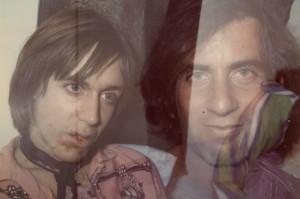
No stranger to controversy, Fields went on to be self-styled “press agent” for the Doors, manage the MC5 through their “motherfucker” scandal (banned from sale in department stores for the offensive lyrics and fired from the Elektra Record label for making it worse), and introduced Iggy Pop to future collaborator David Bowie. Recalling the subsequent expectations from a set of pioneering career relationships, Fields was asked to manage many others, including Aerosmith. He turned them down.”It was ‘suits’ versus songs: I was looking for songs.” The Ramones, on the other hand, were “perfect”, explaining: “I loved them. From the minute I saw them, I wanted to manage them.”
A new generation found fascination with Fields’ insane life story through bestselling coffee-table book Please Kill Me: The Uncensored Oral History of Punk (Legs McNeil and Gillian McCain), and through his personal photography archive, which recorded an incredible set of moments over 50-years in the business — including candid pictures of Warhol superstars, The Ramones, Iggy, and John Waters.
In a music conference heavy with male viewpoints, it was refreshing to hear the next speaker cut through with an alternative punk history. On joining groundbreaking all-female punk/reggae outfit The Slits in 1977, Viv Albertine recalled being stabbed and spat-on in a society that just wasn’t ready for change. “Even on stage we weren’t safe”, she remembered, comparing 1970′s Britain to the 1950s; completely breaking expectations in music, fashion and attitude came with terrifying consequences.
Interviewed by DJ Dave Haslam, and retelling anecdotes from her recent best-selling autobiography Clothes, Clothes, Clothes. Music, Music, Music. Boys, Boys, Boys., Albertine has a disarmingly matter-of-fact approach and was clearly adored by the predominantly male audience. She recalled the first time she realised life was dull upon hearing The Beatles’ Cant Buy Me Love: “It was like the whole world opened up to me”. Adoring John Lennon’s “conversational” voice, she sought out experimental and often political music from the likes of Buffy Sainte-Marie and Jimi Hendrix. “Music was radical then… it was almost as if it was the last time music was relevant.”
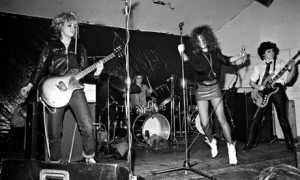
Albertine spoke widely about the difficulty of touring The Slits as a bona-fide band (“No boys copied girls, no boys wished they were in a band with girls… this was the first time people had ever seen girls playing drums, bass, guitar in their lives”), on madcap frontwoman Ari Up (“She was the punk Tina Turner… I thought, My God, here is a performer that will rival Johnny Rotten.”), and manufacturing the band’s ‘look’ — which at one point included rubber stockings and an old man’s string vest fringed with black, spiked Durex (“I thought I’d look like that for the rest of my life… I remember that moment being like my inside and outside was at one… change was a-coming… it was the beginning of the downfall of patriarchy”).
The band disbanded in 1982, and Albertine went on to study filmmaking, working as a director for the BBC and the British Film Institute (BFI). What followed included time spent as a housewife, mother, wife and cancer survivor. Recollecting a difficult fallow period, Albertine cited rejoining The Slits in 2009 as way of finding her identity again, leading to the release of solo album The Vermillion Border in 2012.
Last in the triple bill, and moving the conversation’s focus from the 1990s through to the present day via The Guardian’s Luke Bainbridge, was Britpop/Folktronica artist Jane Weaver. Weaver had a cautionary tale of industry set-backs and disasters to tell — in her words, the “Eastenders of my life”.
Currently touring new solo album The Silver Globe, and running record label Bird since 2002 (an offshoot of the beloved Twisted Nerve Records and the Finders Keepers reissue label), Weaver’s story is in a way comparable to Fields and Albertine; she’s an artist who has resurrected her career again and again, embracing multiple projects and collaborators over a 20-year period.
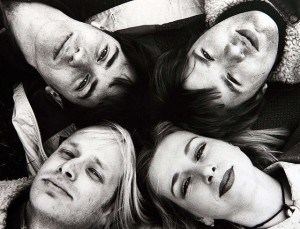
Signed to Polydor as Kill Laura when she was still in Widnes sixth-form college, Weaver’s development agreement led nowhere as their A&R rep was sacked and his replacement decided to end their deal, refusing to release their fully-recorded debut album. Supporting Britpoppers Marion soon after at Manchester’s Band on the Wall, Kill Laura caught the attention of Factory Records founder Rob Gretton.
“I could not understand a word he said”, laughed Weaver. “He had a really nasally Mancunian accent… we ended up working with him as we thought he was quite funny; we just had a good feeling about him”.
The band decided to reject a few more profitable deals in the US and sign with Gretton’s Manchester Records. Yet, as they finished recording their second album in 1997, disaster struck again: the band split up. Their third and final single We Are Modern had already been processed: “It was pretty messy… [but] there was no choice really”.
Weaver moved onto a solo career and finished her first album Supersister in 1998. Gretton died suddenly the following year aged just 46. “Fallout from Rob’s death was massive… we didn’t realise how influential he was [until he was gone]… Rob was a great champion of the underdog and if he liked you he’d do anything to support you.”
Gretton’s death also meant, however, that Supersister was left unreleased. “This is the shitty thing about the industry”, Weaver recalled. “You put your heart and soul into the band… a lot of the stuff was tied up so I couldn’t release it. I could either pay, or write new stuff, so I decided to write new stuff.”
Continuing to write and record as a solo artist, Weaver started new band Misty Dixon in 2002 with Anna Greenwood, Sam Yates and Dave Tyack (who was a founding artist on Twisted Nerve alongside Badly Drawn Boy). What happened next Weaver described as both “tragic” and “farcical”: Tyack went missing on holiday in Corsica. After considerable searches, his remains were found two years later. Album Iced To Mode was released in his absence with permission from his parents in 2003, but the band split up a year later.
Weaver went on to carve out a successful psych-folk career, lauded by the national press and collecting fans and collaborators in Demdike Stare, Wendy Flower, Jarvis Cocker (Meltdown festival) and David Holmes.
So what to learn from these three trailblazers? It may be a cliche, but continuing to work hard despite constant knockbacks, aggressive opposition and acts of god still rings true. It was a welcome addition of sage advice and experience that has an interesting resonance in such a young festival dominated by new acts.
Laura Robertson
See Jane Weaver play at Liverpool Sound City this afternoon 4-4.30pm, Atlantic Stage — £45 one day wristbands available OTD
See the full clashfinder for today’s Sound City programme here – including Sngle Mothers, Gaz Coombes, Peace and Belle and Sebastian



